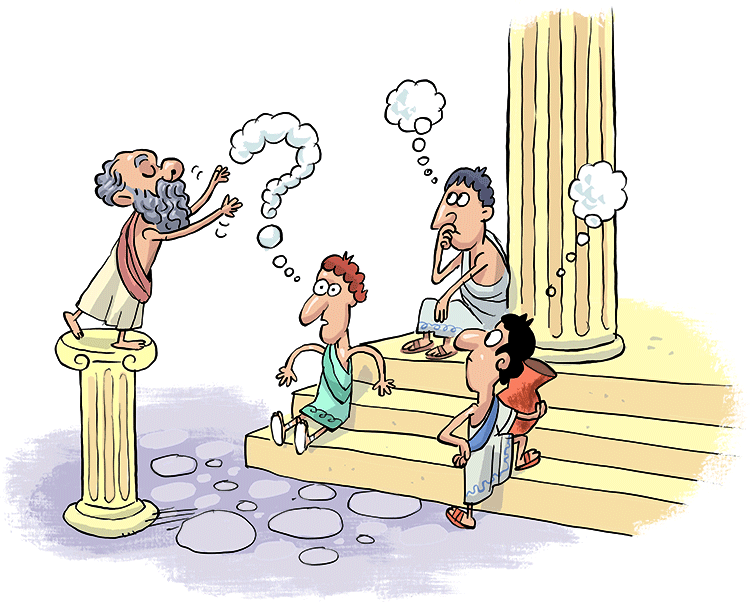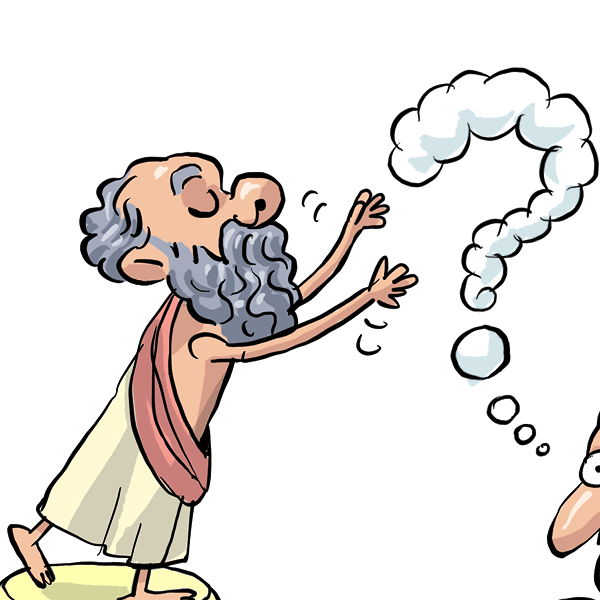Back during the Classical Era of ancient Greece (c. 600 – c. 300), there were no rock stars, famous athletes, or celebrity influencers. Instead, there were philosophers.
During this period, civilization was flourishing. Greek city-states were growing and becoming more powerful, and as they did, people started thinking more. And some of the thoughts they had changed the world, forever.
Perhaps no other philosopher had as much of an impact on the way we think than Socrates. A Athenian native, his ideas, and his way of approaching ideas, greatly impacted the thinking at the time and have gone on to influence many modern scholars.
But despite being one of the most famous ancient Greeks, so much about Socrates remains a mystery, turning him into one of the greatest enigmas of the ancient world.
An Enigma Past and Present
Almost anyway you look at it, Socrates was an intriguing character.
Born the son of a midwife in a small suburb just outside Athens, during the early stages of his life, Socrates was like any other Greek citizen. He participated in the Assembly, and he went off to war when he was called, fighting for Athens against Sparta in the Peloponnesian War.
However, during the latter part of his life, Socrates became more mysterious. According to sources, he did not take care of his appearance, meaning he didn’t shave, had a gut, and didn’t wear any shoes. And, to add to his image, he could often be found in the streets of Athens lecturing about the nature of truth and reality.
This helped Socrates develop a reputation as a wise man and a rebel, and his ideas were extremely attractive to the people of Athens, especially the youth.
But Socrates wasn’t mysterious just to the people who lived alongside him. He also remains a mystery to us. He’s recognized as one of the most important figures in ancient and modern philosophy, yet he never wrote anything down. Not one thing. He didn’t even publish a pamphlet.
Therefore, the only knowledge we have of Socrates and his ideas comes from his students’ depictions of him, which naturally come with bias. So, while he may have had more influence over the field of philosophy than any other person, we will never know for sure exactly what he thought.
The Socratic Method
Socrates was so important to Greek philosophy that students of it often divide its history into before, during, and after Socrates. Talk about being a big deal.
But what made Socrates so special?
First, he had a rather unique way of thinking about things. Mainly, he asked lots and lots of questions.
To do this, he would take an idea, and then he would ask a question about it. Then, from the answer, he would ask another question, and then another, and then another.
For example, you might ask, “Why is the sky blue?” The answer to this would be, “Because the particles in the air give off a blue color when lit by the sun.” But then Socrates would ask, “What is blue?” The answer to that might be, “It’s a color.” But then he would ask “What is color?”
The conversation would go on, and through it, the people involved would get closer to the truth. They might never reach a definite conclusion, though. Instead, they would better understand the assumptions and premises behind their ideas, which would teach them about the issue as a whole.
Socrates’ use of questioning things to find out the truth is a practice we still use today. It’s called the Socratic Method, and not only is it important to scientific inquiry, but it’s also used in trials. Ever wondered why lawyers ask so many questions? Well, it’s because by doing so they can get to the truth, or some version of it, and determine whether or not someone is guilty or innocent.

Socrates: The Don’t-Know-it-All
Socrates applied his method to pretty much any topic
This is because Socrates believed it was impossible to ever completely know the truth. In fact, he was once quoted as saying, “I know that I know nothing.” The actual quote is “what I do not know I do not think I know,” but it’s been adapted to make more sense in a modern context.
In truth, Socrates had a lot of strong opinions on a wide range of topics. But he stopped short of saying he knew any one thing for sure, for that, he said, was impossible.
A Man of Virtue
Despite admitting that he could never truly know the truth, Socrates still thought pursuing it was worthwhile. The reasoning for this, he argued, was that no human being ever did anything bad knowing it was bad. Instead, if they did something evil or wrong or violent, it was because they were ignorant.
Therefore, he claimed that learning and knowledge were the most virtuous pursuits, for they alone would help a person minimize the bad things they do.
In fact, Socrates believed so much in the power of living a virtuous life that he argued it was the best way to achieve happiness and a good life while here on Earth, even if that meant butting heads with the people in power.
The Trial of Socrates
Above all else, Socrates was concerned with what was right. He wanted to find out what was the most virtuous way of living, and he didn’t just accept what other people were doing as okay.
When working with his students, he often encouraged them to do the same thing, and he gained a reputation in Athens as being a dissenter, aka someone who rejects the status quo.
From the perspective of a scientist or philosopher, this is a wonderful way to approach the world. For politicians, though, his thoughts were dangerous.
Interestingly, Socrates was a major critic of democracy, which was the form of government present in Athens at the time. He felt democracies were too easily swayed and corrupted, and he often praised Athens’ archrival, Sparta, for its efficiency.
This was all well and good, except it made the people in power in Athens at the time rather angry. And after a while, they got fed up with him and his ideas and decided to get rid of him.
He was charged with the crime of “corrupting the minds of the youth” and impiety, which meant not believing in the gods of the state. He was found guilty and sentenced to drink poisoned hemlock, which was the preferred form of execution in ancient Athens.
According to the sources we have, Socrates actually had chances to escape this fate. But he chose not to run. Instead, he almost invited death. He did this in part because he believed that an ideal society must be able to depend on its laws. And since he had agreed to live in Athens, he had also agreed to live by its laws and face whatever punishment came from those laws.
Such a stance speaks to how convicted Socrates was of living a virtuous life. Even when facing death, he still wanted to do what was “right.”
The other reason he didn’t run is because he famously didn’t fear death. He didn’t think it was a reason to break from virtue, and so he chose to stay and accept his sentence.
Of course, we have no first-hand account of his trial and death, only secondary sources written by his students and followers. But given how Socrates lived, it wouldn’t be surprising if this is how he faced death. In the end, though, all his questions, virtues, and principles wound up killing him. But despite the way his life ended, Socrates had a profound and lasting impact on both the society in which he lived and the many that would come after him.
The Father of Modern Philosophy
Due to Socrates’ willingness to examine any subject, as well as his method for doing so, he changed the way people think. Together with Plato and Aristotle, these three men introduced ideas to the world that had never before been considered.
At the time, the response was mixed. But over the course of history, we have come to recognize how revolutionary these ideas were, and just how much of an impact they have had on our modern world.
Written by Matthew Jones
Illustrated by Jean Galvao
